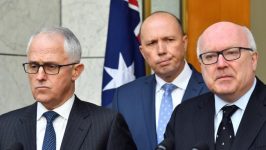The Federal Government’s Continuing Attack on Civil Liberties

The Institute of Public Affairs (IPA) released its 2017 Legal Rights Audit report on December 27. The report, which is the conservative think tank’s fourth annual audit of Commonwealth laws, found that over the last year the Turnbull government continued to pass laws that infringe upon basic rights.
The IPA’s initial 2014 audit identified 262 provisions within current federal acts that “breach fundamental legal rights.” It is important to note that the report focused on just four areas: the presumption of innocence and burden of proof, procedural fairness, the right to silence and the privilege against self-incrimination. Many other areas were not looked at.
The 2015 and 2016 audits revealed that these four categories had been further eroded by the passing of new federal legislation, so that by the end of 2016, there were 307 provisions which infringed upon these protections.
The 2017 audit found that over the last 12 months, 19 new federal provisions had been enacted that breach the four areas.
The Melbourne-based IPA’s report concluded that “the extent to which basic legal rights are being eroded poses a significant threat to the rule of law in Australia.” And in order to protect citizens’ rights, people must be “vigilant in safeguarding” them.
The fact the report looked only at federal laws is also notable. Indeed in 2016, the Chief Justice of New South Wales, Tom Bathurst, identified 397 NSW laws which impinge upon three protections alone: the presumption of innocence, the right against self-incrimination and client legal privilege.
The judge called the figure “conservative”, suggesting there may be more state laws which dilute these three fundamental legal safeguards.
The Turnbull government’s assault
IPA research fellow Morgan Begg spoke to Fairfax Media on the day the report on federal laws was released. He called upon the newly-appointed Australian attorney general Christian Porter to guard against the ongoing erosion of rights in this country.
The IPA pointed to former attorney general George Brandis, treasurer Scott Morrison and home affairs minister Peter Dutton as the main people responsible for the provisions that are infringing upon our basic freedoms and legal safeguards.
According to Mr Begg, the attack on rights is “entrenched in the law-making process” in this country. He further questioned why the government had basically disregarded the findings of the Australian Law Reform Commission’s (ALRC) 2015 Traditional Rights and Freedoms report.
The 600 page report, which was tabled in March 2016, examined the encroachment of Commonwealth laws upon traditional rights, freedoms and privileges recognised by the common law.
Law Council of Australia president Fiona McLeod joined Mr Begg in calling on the attorney general to review the report. Ms McLeod said that instead of acting upon the recommendations of the report, the Turnbull government has chosen to further erode basic rights in the name of counterterrorism.
The findings of the Freedoms inquiry
The ALRC report was the result of the Freedoms inquiry investigation that was commissioned by then federal attorney general George Brandis back in May 2014.
The inquiry found that a wide range of Commonwealth laws currently encroach upon basic rights and freedoms in Australia. These include the freedom of speech, freedom of association and assembly, freedom of movement, the right to a fair trial and the right to procedural fairness.
The report found that a number of counterterrorism and national security laws, as well as recent migration laws, have steadily been whittling away at the basic rights of Australians.
The report then goes onto list a wide range of Commonwealth laws that warrant a review. Although, besides some unsuccessful moves by the federal government to amend section 18C of the Racial Discrimination Act, these recommendations have largely been ignored.
However, the report found that there are “very few, if any” federal laws that infringe upon religious freedoms. This is significant as the federal government has recently set up an expert panel to inquire into “whether Australian law adequately protects the human right to religious freedom.”
Headed by Howard-era attorney general Philip Ruddock, the inquiry was established in response to the concerns of Coalition MPs and ‘No’ voters over same-sex marriage laws.
Little protections within the law
Unlike the supreme law of the United States, the Australia Constitution protects only a handful of rights. At the time of its drafting, lawmakers voted against including provisions within the document that would protect a wide range of basic rights for Australian citizens.
The few rights protected within the Australian Constitution include the right to vote, which is protected under section 41 of the document. Section 51(xxxi) provides that a person has the right to fair compensation if the government acquires their property.
Section 80 of the Constitution protects the right to a trial by jury, while section 116 protects freedom of religion. And the High Court of Australia has also found that a right to freedom of political communication is implied in the constitution.
Australia has ratified seven out of the eight major international conventions that seek to define and protect people’s “inalienable human rights.” And while this means the government has committed to upholding these rights internationally, it’s provided little protections for Australians domestically.
Time for rights protection legislation
As seen with the ALRC Traditional Rights and Freedoms report, even when federal politicians commission an inquiry into the erosion of basic rights under the law, those very same politicians can simply ignore the findings of such an inquiry and continue to enact laws that eat away at basic freedoms.
So, perhaps it’s time for a different approach.
Currently, Australia is the only democratic nation not to have a bill guaranteeing its citizens’ rights under the law.
And there’s a growing number of politicians and intellectuals who are calling for the establishment of such an act. Recently, Australian Independent MP Andrew Wilkie, Australian Greens senator Nick McKim, and NSW Council for Civil Liberties president Stephen Blanks have all been doing so.
As UNSW dean of law George Williams told Sydney Criminal Lawyers® last November an Australian bill of rights would not only protect Australians’ rights under the law, but it would mean that Australian governments would have to ensure that the laws they enact don’t infringe upon these rights.
According to Mr Williams, since the early 2000s when nations like the US and the UK, along with Australia, began enacting a wide range of counterterrorism laws, the volume of laws passed in this country has been far greater, and key aspects of the Australian laws go further.
Indeed, a bill that required Australian governments to ensure that laws are being passed in accordance with human rights standards, would prevent the need for successive inquires to point out that the government is continuing to slowly whittle away at the basic rights of all Australians.








